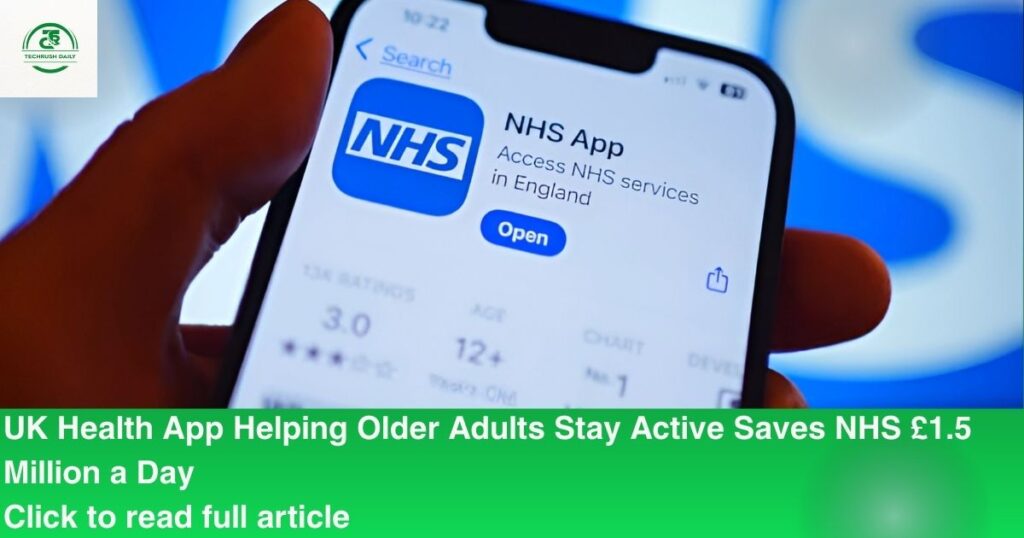
The UK’s National Health Service (NHS) is under constant pressure, with hospital admissions and emergency visits rising every year. But a new health app designed for older adults is proving to be a game-changer. The app helps seniors stay active, detects early signs of illness, and reduces the risk of falls , saving the NHS an estimated £1.5 million per day.
A Digital Solution for Ageing Populations
As life expectancy increases, the UK faces the challenge of supporting a rapidly ageing population. Falls and mobility-related issues are among the leading causes of hospital admissions for the elderly. According to NHS data, falls cost the health service billions annually and often result in long-term complications.
The newly introduced digital health app directly addresses this issue by encouraging older people to stay on their feet, maintain balance, and remain independent for longer.
How the Health App Works
The app uses AI-powered monitoring and real-time alerts to identify subtle changes in a person’s health and activity patterns.
- Fall detection and prevention: The app tracks gait, balance, and walking speed to predict fall risks.
- Early illness detection: By monitoring small changes, like slower walking or reduced movement, the app alerts carers and healthcare staff before conditions worsen.
- Remote monitoring: Family members and carers can view updates and step in when needed.
- Encouragement to stay active: The app motivates users to walk daily, track progress, and maintain mobility.
By combining prevention and early intervention, the app reduces unnecessary hospital admissions.
Huge Cost Savings for the NHS
The NHS spends millions each day treating falls, fractures, and related illnesses among the elderly. By cutting down hospital visits, this app is saving an estimated £1.5 million daily.
This is not just about saving money, it’s about freeing up hospital beds, reducing waiting times, and improving overall patient care. With the NHS facing staffing shortages and funding challenges, digital tools like this provide vital support.
Why Technology is Key for Elderly Care
The rise of digital health technology is reshaping how societies care for ageing populations. Apps like this provide:
- Accessibility: Elderly users don’t need complex gadgets, just a simple app.
- Prevention focus: Shifting healthcare from treatment to prevention.
- Support for carers: Families and healthcare providers receive real-time updates.
- Integration with NHS digital strategy: Fits into the UK’s long-term goal of using technology to make healthcare more efficient.
Challenges Ahead
Despite its promise, there are still challenges:
- Digital literacy: Some elderly users may struggle with smartphones.
- Privacy concerns: Health data must be securely stored and shared.
- Wider adoption: Expanding the app nationwide will require investment and training.
Still, experts believe the potential benefits far outweigh the risks.
The Future of Digital Elderly Care
The success of this health app signals a shift in healthcare delivery. By empowering older adults to take charge of their health, technology can reduce hospital strain and improve quality of life.
Looking ahead, such apps may integrate with wearables, smart home sensors, and AI medical assistants, offering even more personalized care. If adopted across the UK, the NHS could save billions annually, while seniors enjoy greater independence.
FAQs on the Health App for Older Adults
1. What is the NHS elderly care app?
It is a digital health app that tracks activity, detects early signs of illness, and helps prevent falls in older adults.
2. How much money does the app save the NHS?
The app is estimated to save the NHS £1.5 million per day by reducing hospital admissions.
3. How does the app detect illness?
It monitors walking patterns, activity levels, and subtle health changes, alerting carers to potential problems before they worsen.
4. Does the app replace doctors?
No. The app supports doctors by providing early alerts, but medical professionals always make the final diagnosis.
5. What conditions can the app help prevent?
The app mainly helps prevent falls, fractures, infections, and mobility-related illnesses.
6. Do elderly users need advanced tech knowledge?
No. The app is designed to be simple and user-friendly, requiring minimal digital skills.
7. Is this app available across the UK?
Currently, it is being rolled out in select areas, but experts hope it will be scaled nationwide.
8. How does it support the NHS long-term?
By reducing admissions and freeing up resources, the app supports the NHS’s digital-first strategy for sustainable healthcare.
9. Can similar apps be used worldwide?
Yes. With ageing populations globally, similar health apps can benefit healthcare systems in Europe, Asia, and North America.
10. What’s next for digital elderly care?
Future developments may include integration with AI wearables, smart homes, and remote healthcare platforms.
Final Thoughts
The UK’s new health app for older adults shows how digital innovation can transform healthcare. By preventing falls, detecting illness early, and supporting carers, the app not only improves senior independence but also saves the NHS millions daily.
As populations age, such technology could become a cornerstone of healthcare, offering both cost savings and better patient outcomes. Tamil Nadu’s AI project in India and this UK initiative together show one truth: the future of healthcare is digital.
















